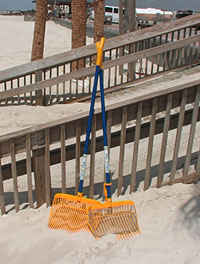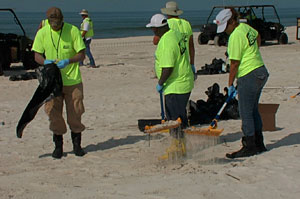Sand-sifting forks prove their worth in Gulf spill
Forks that separate oil from sand have joined beach cleaning machines, vacuum excavators and booms in scrubbing beaches following the Gulf oil spill.

Battery-powered mini-tine Flex’n Forks from White City, Ore.-based Equi-Tee are clearing beaches in Gulf Shores, Ala., and Pensacola, Fla. The units sift out tarballs and leave the sand behind, says Equi-Tee president Joseph Berto.
Shovels have proven fairly inefficient for removing oil on Gulf coast beaches, adds Berto. “For every ounce of tarball, cleanup crews were taking away a pound of sand. There really isn’t any effective way to reduce that, except if you use something that has a finer spacing. Our company makes a fork called a mini-tine fork that is used for sifting sawdust, and when we took that on to the Gulf, we found that it was really effective at sifting tarball patties, and leaving the sand behind.”
Sand removal dropped more than 75 percent when crews shifted from shovels to the forks, says Berto. “Hundreds of our forks are still in use cleaning up the tarballs that were left in locations where the larger pull-type machines cannot go. They are also sifting up new tarballs as they wash ashore.”

The oil spill cleanup could be a lengthy process, says Berto. “The oil is going to be washing up into tourist beaches for a long time. There’s going to be a commitment by either BP or by cities to pick the oil up, and it’s not going to be done by beach-sifting machines, because it’s not a big enough volume to hire tractors and other large equipment. What’s going to happen is when the stuff comes in, you send out a crew of 10 or 12 who walk along the beach, and they push a little button on our auto-sifting fork and separate the sand and get what tarballs are actually visible.” Remote near-shore islands, adds Berto, are especially suited for the Equi-Tee forks because large sand-sifting machines could damage delicate ecosystems.
Berto thinks his company will be involved in the Gulf oil spill cleanup for a lengthy period. His firm’s fork has met requirements and has been approved by BP, which may facilitate purchases by cities. Other applications for the fork include retrieving spent ammunition on police firing ranges and removing cigarette butts and pine needles from sandy walkways, playgrounds and public areas. The units were originally designed to separate horse bedding from stall waste.
The price tag for the screened and powered fork used in tarball removal is $249. A model called the Shake’n Fork, which is the auto-sifting version of the Flex’n Fork, comes with a lithium ion battery and electronics pack, variable speed trigger, and integral reciprocating motor. The fork has a screened basket design and other enhancements to withstand the severe Gulf environment. The fork can typically run for several days without a recharge. One version of the fork has a lightweight carbon fiber hand pole. For more information, go to www.tarballfork.com.




















